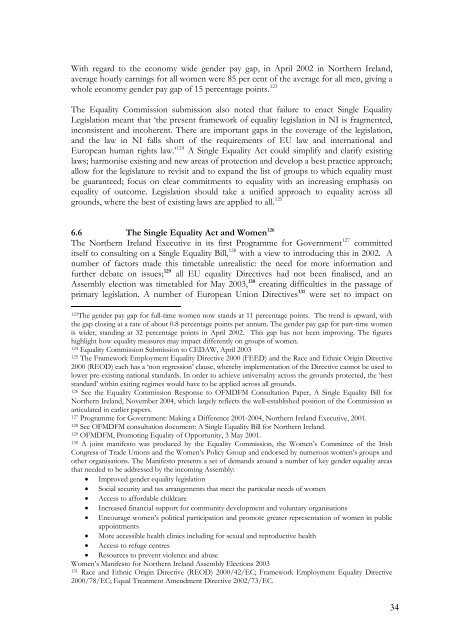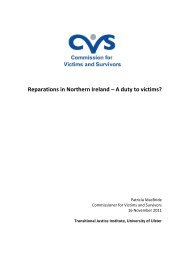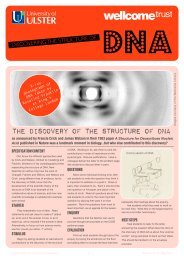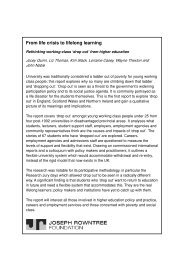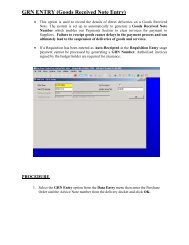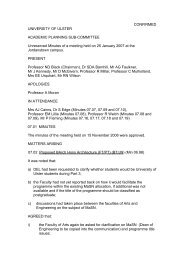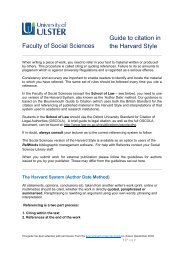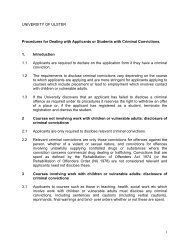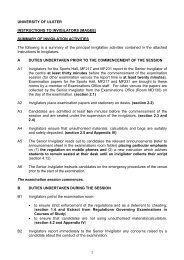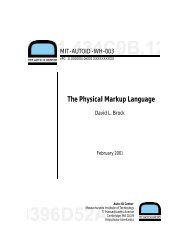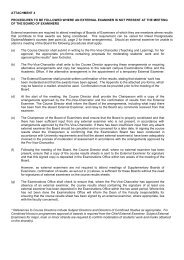Agreement Reached in the Multi-Party Negotiations - Transitional ...
Agreement Reached in the Multi-Party Negotiations - Transitional ...
Agreement Reached in the Multi-Party Negotiations - Transitional ...
Create successful ePaper yourself
Turn your PDF publications into a flip-book with our unique Google optimized e-Paper software.
With regard to <strong>the</strong> economy wide gender pay gap, <strong>in</strong> April 2002 <strong>in</strong> Nor<strong>the</strong>rn Ireland,<br />
average hourly earn<strong>in</strong>gs for all women were 85 per cent of <strong>the</strong> average for all men, giv<strong>in</strong>g a<br />
whole economy gender pay gap of 15 percentage po<strong>in</strong>ts. 123<br />
The Equality Commission submission also noted that failure to enact S<strong>in</strong>gle Equality<br />
Legislation meant that ‘<strong>the</strong> present framework of equality legislation <strong>in</strong> NI is fragmented,<br />
<strong>in</strong>consistent and <strong>in</strong>coherent. There are important gaps <strong>in</strong> <strong>the</strong> coverage of <strong>the</strong> legislation,<br />
and <strong>the</strong> law <strong>in</strong> NI falls short of <strong>the</strong> requirements of EU law and <strong>in</strong>ternational and<br />
European human rights law.’ 124 A S<strong>in</strong>gle Equality Act could simplify and clarify exist<strong>in</strong>g<br />
laws; harmonise exist<strong>in</strong>g and new areas of protection and develop a best practice approach;<br />
allow for <strong>the</strong> legislature to revisit and to expand <strong>the</strong> list of groups to which equality must<br />
be guaranteed; focus on clear commitments to equality with an <strong>in</strong>creas<strong>in</strong>g emphasis on<br />
equality of outcome. Legislation should take a unified approach to equality across all<br />
grounds, where <strong>the</strong> best of exist<strong>in</strong>g laws are applied to all. 125<br />
6.6 The S<strong>in</strong>gle Equality Act and Women 126<br />
The Nor<strong>the</strong>rn Ireland Executive <strong>in</strong> its first Programme for Government 127 committed<br />
itself to consult<strong>in</strong>g on a S<strong>in</strong>gle Equality Bill, 128 with a view to <strong>in</strong>troduc<strong>in</strong>g this <strong>in</strong> 2002. A<br />
number of factors made this timetable unrealistic: <strong>the</strong> need for more <strong>in</strong>formation and<br />
fur<strong>the</strong>r debate on issues; 129 all EU equality Directives had not been f<strong>in</strong>alised, and an<br />
Assembly election was timetabled for May 2003, 130 creat<strong>in</strong>g difficulties <strong>in</strong> <strong>the</strong> passage of<br />
primary legislation. A number of European Union Directives 131 were set to impact on<br />
123 The gender pay gap for full-time women now stands at 11 percentage po<strong>in</strong>ts. The trend is upward, with<br />
<strong>the</strong> gap clos<strong>in</strong>g at a rate of about 0.8 percentage po<strong>in</strong>ts per annum. The gender pay gap for part-time women<br />
is wider, stand<strong>in</strong>g at 32 percentage po<strong>in</strong>ts <strong>in</strong> April 2002. This gap has not been improv<strong>in</strong>g. The figures<br />
highlight how equality measures may impact differently on groups of women.<br />
124 Equality Commission Submission to CEDAW, April 2003<br />
125 The Framework Employment Equality Directive 2000 (FEED) and <strong>the</strong> Race and Ethnic Orig<strong>in</strong> Directive<br />
2000 (REOD) each has a ‘non regression’ clause, whereby implementation of <strong>the</strong> Directive cannot be used to<br />
lower pre-exist<strong>in</strong>g national standards. In order to achieve universality across <strong>the</strong> grounds protected, <strong>the</strong> ‘best<br />
standard’ with<strong>in</strong> exit<strong>in</strong>g regimes would have to be applied across all grounds.<br />
126 See <strong>the</strong> Equality Commission Response to OFMDFM Consultation Paper, A S<strong>in</strong>gle Equality Bill for<br />
Nor<strong>the</strong>rn Ireland, November 2004, which largely reflects <strong>the</strong> well-established position of <strong>the</strong> Commission as<br />
articulated <strong>in</strong> earlier papers.<br />
127 Programme for Government: Mak<strong>in</strong>g a Difference 2001-2004, Nor<strong>the</strong>rn Ireland Executive, 2001.<br />
128 See OFMDFM consultation document: A S<strong>in</strong>gle Equality Bill for Nor<strong>the</strong>rn Ireland.<br />
129 OFMDFM, Promot<strong>in</strong>g Equality of Opportunity, 3 May 2001.<br />
130 A jo<strong>in</strong>t manifesto was produced by <strong>the</strong> Equality Commission, <strong>the</strong> Women’s Committee of <strong>the</strong> Irish<br />
Congress of Trade Unions and <strong>the</strong> Women’s Policy Group and endorsed by numerous women’s groups and<br />
o<strong>the</strong>r organisations. The Manifesto presents a set of demands around a number of key gender equality areas<br />
that needed to be addressed by <strong>the</strong> <strong>in</strong>com<strong>in</strong>g Assembly:<br />
• Improved gender equality legislation<br />
• Social security and tax arrangements that meet <strong>the</strong> particular needs of women<br />
• Access to affordable childcare<br />
• Increased f<strong>in</strong>ancial support for community development and voluntary organisations<br />
• Encourage women’s political participation and promote greater representation of women <strong>in</strong> public<br />
appo<strong>in</strong>tments<br />
• More accessible health cl<strong>in</strong>ics <strong>in</strong>clud<strong>in</strong>g for sexual and reproductive health<br />
• Access to refuge centres<br />
• Resources to prevent violence and abuse<br />
Women’s Manifesto for Nor<strong>the</strong>rn Ireland Assembly Elections 2003<br />
131 Race and Ethnic Orig<strong>in</strong> Directive (REOD) 2000/42/EC; Framework Employment Equality Directive<br />
2000/78/EC; Equal Treatment Amendment Directive 2002/73/EC.<br />
34


